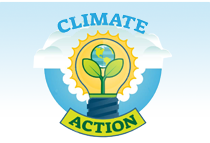Climate
While weather describes the specific atmospheric conditions at a given time, climate describes the average atmospheric conditions over long periods of time – decades, centuries, and longer. Climate change is a change in long-term weather patterns resulting from natural or manmade causes
Greenhouse Gases
Greenhouse gases (GHGs) are chemical compounds in the atmosphere that absorb the infrared energy or heat that is radiated from the Earth’s surface back to the atmosphere. GHGs allow less heat to escape back to space which means more heat is captured in the lower atmosphere. Some GHGs occur naturally in the atmosphere, but human activities such as burning fossil fuels increase the amount of these gases in the atmosphere. Some human activities, such as planting trees, can also lead to a reduction of GHGs in the atmosphere. GHGs include water vapor, carbon dioxide, methane, ozone, nitrous oxide, and chlorofluorocarbons.
The Get2Green Energy Dashboard includes data on GHG emissions for three GHGs:
carbon dioxide, methane, and nitrous oxide.
What is FCPS Doing About Climate Change?
School Board Policy 8542 – Environmental Stewardship requires an annual Greenhouse Gas Inventory report and for FCPS to implement policies and programs to reduce the school division’s greenhouse gas emissions.
FCPS is participating in the Better Buildings Challenge through the US Department of Energy. The Better Buildings Challenge asks leading businesses, cities, states, universities, and school districts to commit to improving the energy efficiency of their buildings by at least 20% over a decade. FCPS is committed to achieve a 20% reduction in energy intensity from a 2013 baseline by 2023.
On October 11, 2018, the FCPS School Board passed a resolution on climate change action. The resolution calls on the Virginia General Assembly and United States Congress to act on climate change and directs the superintendent of FCPS to report changes in policy to the Board that support the goal of reducing carbon consumption, along with staff proposals to make best use of those opportunities in facilities and transportation planning.
In April 2019, the Fairfax County Board of Supervisors and School Board formed the Joint Environmental Task Force (JET). The JET’s mission is to join the political and administrative capabilities of the county and the school system to proactively address climate change and environmental sustainability. The task force includes community partners from higher education, industry, and community and student advocacy groups to set and meet aggressive goals in areas of common influence, such as workforce development; infrastructure and sustainability of public facilities and transportation; land use planning; communication and community engagement; and other challenges and opportunities as they arise. The task force will provide a forum for collaborating and addressing countywide issues and aligning institutional policies and practices pertaining to climate change and environmental sustainability.
In addition to the work happening at the district and county level, student green teams across FCPS are working to reduce emissions by conducting climate audits, reducing classroom energy use, running no-idling campaigns for Kiss and Ride, and planting native habitats on their school grounds.


